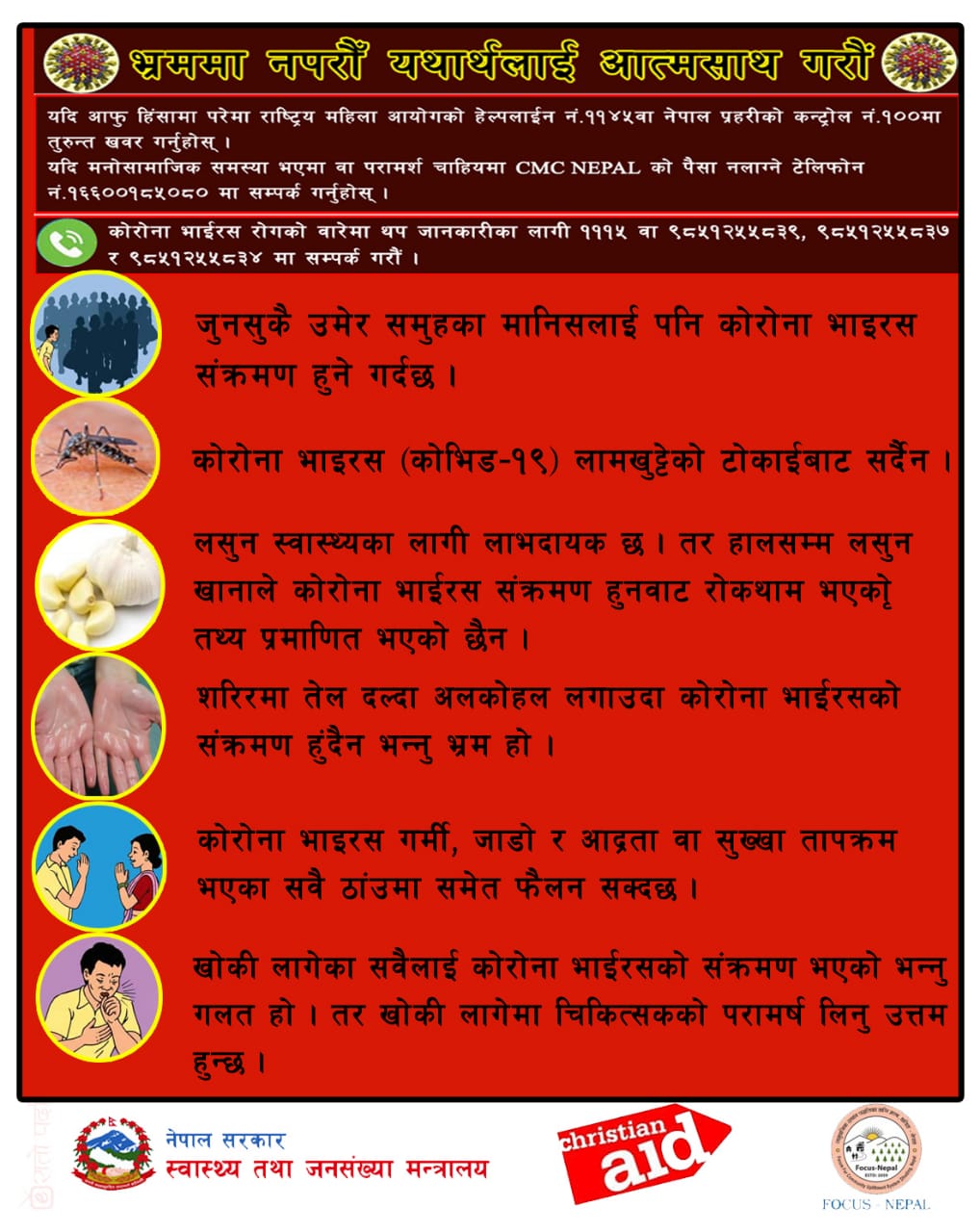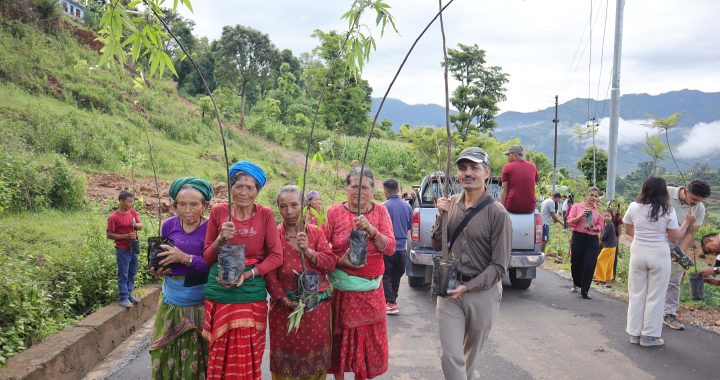
–Rashila Adhikari
In the shadows of Nepal’s towering mountains, a silent epidemic is unfolding—an epidemic that claims about 20 lives every day. Suicide rates in Nepal have soared in the last decade, turning into a critical problem that calls for urgent action. Once whispered in hushed tones, the issue of suicide and mental health issues is now a public health crisis that demands our immediate attention.
The report of the World Health Organization (WHO) showed that seven lakh people lose their lives to suicide each year and one person commits suicide every 40 seconds globally.
A study carried out by the Nepal Health Research Council in the past shows that about 13 percent of Nepalese suffer from some form of mental disorder. This means around one in eight Nepalese has mental health issues.
75,000 Lives Lost: The Harsh Reality of a Decade of Suicides
As per the news published on The Kathmandu Post: “At the time when the government committed to SDGs in 2015, around 16 people took their own lives every 24 hours,” as per Basudev Karki, a consultant psychiatrist. “Our government had committed to reduce the suicide rate to 9.7 per 100,000 each year by 2022, but this number rose to 24, and last year it increased further to 25.”
The government aims to reduce the suicide rate to 4.7 per 100,000 population by 2030 to meet the SDG targets, but as the deadline nears, more people are killing themselves every day.
| Year | Reported Suicides | % Increase |
| 2023 | 7,223 | 1.49% |
| 2022 | 7,117 | -0.34% |
| 2021 | 7,141 | 14.42% |
| 2020 | 6,241 | 8.46% |
| 2019 | 5,754 | 8.22% |
| 2018 | 5,317 | 3.77% |
| 2017 | 5,124 | 9.49% |
| 2016 | 4,680 | 8.03% |
| 2015 | 4,332 | -3.82% |
| 2014 | 4,504 | – |
The World Health Organization reports that one in four people worldwide experiences mental or neurological disorders at some point in their lives. Currently, about 450 million people are living with these conditions, making mental disorders one of the leading causes of ill health and disability globally.
As per the National Mental Health Survey, 6.5 percent of the population plans and thinks about committing suicide. Of the total suicide in Nepal, 83.39 per cent do it by hanging.
The numbers are staggering, but these are more than statistics. They represent lives lost, families shattered, and communities left in grief.
COVID-19’s Devastating Impact on Mental Health
The global COVID-19 pandemic has exacerbated Nepal’s suicide crisis. In 2021, suicide rates spiked by more than 10%, the highest single-year increase in recent history. Social isolation, economic downturn, and overwhelming uncertainty fueled a surge in mental health issues. Over 7,000 suicides were reported that year, marking a grim milestone in Nepal’s mental health history.
According to Nepal Police data, the rate of suicide among men is notably higher than women, with young people aged 15 to 29 being the most vulnerable. Mental health problems, aggravated by unemployment and family disputes, have pushed many to a breaking point.
The Impact of Nepal’s Earthquake on Mental Health and Suicide
The devastating earthquake of 2015 not only claimed nearly 9,000 lives and displaced millions but also left deep psychological scars across the nation. The trauma, loss of loved ones, and destruction of homes created a massive surge in mental health disorders such as post-traumatic stress disorder (PTSD), anxiety, and depression. Many survivors struggled to rebuild their lives, grappling with hopelessness in the face of uncertainty.
Studies show a notable increase in suicide rates following the earthquake, as thousands of individuals were unable to access mental health support. With Nepal’s already fragile mental health infrastructure further strained by the disaster, the psychological aftermath remains a critical, yet often overlooked, consequence of the earthquake.
Mental Health Infrastructure: Critically Underdeveloped
Nepal’s mental health care system is woefully inadequate to meet this escalating crisis. The World Health Organization (WHO) reports that one in four Nepalese struggles with a mental health disorder, yet the government allocates a mere 0.22% of its health budget to mental health care.
- Nepal has fewer than 250 registered psychiatrists to serve a population of 30 million.
- There are fewer than 100 clinical psychologists across the entire country.
- Mental health services are concentrated in urban areas, leaving rural populations severely underserved.
The lack of resources means that thousands of individuals who need mental health care do not have access to it, worsening the crisis.
Why Are Suicides Rising in Nepal?
While mental health disorders are a leading cause, other social, economic, and cultural factors also contribute:
- Mental Health Disorders: Depression, anxiety, schizophrenia, and other untreated mental illnesses remain the primary drivers of suicides.
- Economic Hardships: Unemployment and poverty weigh heavily on individuals, leading to hopelessness, particularly among men.
- Domestic Violence and Family Conflict: Tensions within families, exacerbated by cultural taboos, lead many to seek an irreversible escape.
- Substance Abuse: Alcohol and drug addiction is a growing issue in both urban and rural areas, contributing to impulsive suicides.
- Social Isolation: The breakdown of traditional support networks and increased urban migration has left many people feeling isolated and unsupported.
How Can Suicides Be Prevented?
Suicide is preventable, and every individual in society has a role to play. By focusing on early intervention and strengthening community networks, lives can be saved.
- Open Conversations: Encourage open dialogues about mental health in homes, schools, and workplaces. Silence only perpetuates stigma.
- Mental Health Education: Teaching mental health literacy from an early age helps individuals recognize signs of distress, both in themselves and others.
- Support Systems: Family members and friends should reach out to those showing signs of depression or suicidal thoughts. Studies show that timely intervention can reduce suicidal behavior by 30%.
- Access to Professional Help: Encouraging individuals to seek professional counseling or psychiatric help is vital. Currently, organizations such as TPO Nepal and KOSHISH Nepal provide essential support services, though there is still much more to be done to make these accessible across the country.
- National Mental Health Helpline: Make use of services like TPO’s Helpline 1166 which offers counseling to those having thoughts of self-harm/suicide.
The rough estimate that a person succeeds in committing suicide after 20-25 failed attempts make it clear that early detection of suicide-oriented signs can lead to its prevention.
The Role of Government and Society
Nepal cannot afford to ignore this issue any longer. The government must take the following steps to mitigate the rising suicide rates:
- Increase Mental Health Budget: Allocating more resources to mental health services, including hiring more professionals and expanding care to rural areas, is critical.
- Raise Awareness: Launch national campaigns to reduce the stigma around mental health and encourage individuals to seek help.
- Strengthen Crisis Intervention: Establish a comprehensive network of suicide prevention centers and hotlines across all provinces.
Conclusion: A Call for Collective Action
Suicide is preventable, but only if we take bold and immediate action. The rise in suicide cases in Nepal should serve as a wake-up call to all of us—government officials, health professionals, and all citizens. We cannot afford to lose more lives to a crisis that can be managed with the right interventions.
You can be the difference in someone’s life today. Talk, listen, and act. Together, we can turn the tide against Nepal’s suicide epidemic.
As this series continues, we will explore deeper into the root causes of mental health issues in Nepal, share personal stories of survivors, and highlight organizations working on the front lines to provide support. Stay informed, stay connected, and be part of the solution.
If you or someone you know is having suicidal thoughts, following helpline numbers may be helpful:
National Helpline for Suicide Prevention: 1166
Tribhuvan University Teaching Hospital: 9840021600
Patan Hospital crisis helpline for suicide prevention: 9813476123
The Transcultural Psychosocial Organisation: 16600102005





















